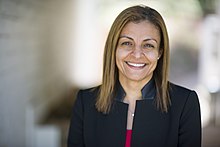Maryana Iskander
American social entrepreneur and lawyer, CEO of Wikimedia Foundation (2022- )
Maryana Iskander (born September 1, 1975) is an Egyptian-born American social entrepreneur and lawyer. In 2022, she became the chief executive officer (CEO) of the Wikimedia Foundation, succeeding Katherine Maher. Iskander was the CEO of the Harambee Youth Employment Accelerator and a former chief operating officer of the Planned Parenthood Federation of America in New York.

Quotes
edit- Of the three million job losses in South Africa as a result of Covid-19, two million were held by women. While the deck has always been stacked against women, Covid-19 exposes the staggering inequalities and barriers that women face in finding, and keeping, work. Even before the Covid-19 pandemic, young women shouldered additional burdens from childcare and other household responsibilities. They had less time and money to look for work, and faced a greater threat of harassment even if they could get a job interview. Young women are also less likely to have some of the tangible attributes that significantly boost the chances of finding work, such as a matric or a driver’s licence. The impact of Covid-19 has exacerbated all of these challenges – with increased gender-based violence, missed educational opportunities and a precarious economic environment where women are hardest hit. Never has it felt truer that women need to work twice as hard to get half as far. It’s not just about equity – the evidence is clear about investing in women. Greater gender equality leads to better development outcomes, reducing income inequality and supporting economic resilience. Women’s increased economic participation leads to a higher spend on schooling for children, with important implications for growth in the long run.
- There are a few core principles of Wikimedia projects, including Wikipedia, that I think are important starting points. It’s an online encyclopedia. It’s not trying to be anything else. It’s certainly not trying to be a traditional social media platform in any way. It has a structure that is led by volunteer editors. And as you may know, the foundation has no editorial control. This is very much a user-led community, which we support and enable.
The lessons to learn from, not just with what we’re doing but how we continue to iterate and improve, start with this idea of radical transparency. Everything on Wikipedia is cited. It’s debated on our talk pages. So even when people may have different points of view, those debates are public and transparent, and in some cases really allow for the right kind of back and forth. I think that’s the need in such a polarized society — you have to make space for the back and forth. But how do you do that in a way that’s transparent and ultimately leads to a better product and better information?
Quotes about person/work
edit- Today, the Board of Trustees of the Wikimedia Foundation announced the appointment of Maryana Iskander as the organization’s new CEO. She is a globally recognized social entrepreneur and an expert in building cross-sector partnerships that combine innovative technology with community-led solutions to close opportunity gaps. As CEO of Wikimedia Foundation, the global nonprofit organization that supports Wikipedia and 12 other free knowledge projects, Maryana will champion the organization’s goal to ensure that people everywhere can access and share knowledge freely. She will formally begin on January 5, 2022 and report to the Foundation’s Board of Trustees.
- After over half a decade of working with Planned Parenthood as their Chief Operating Officer, Maryana fell in love and made the jump from the United States to the southernmost tip of Africa. Even though this love affair didn’t last, her love affair with South Africa did, and it ushered her into a career path that saw her working on solving the problems of youth unemployment in Africa, to her current position, leading the Wikimedia Foundation.
- Maryana has dedicated her career to breaking down systemic barriers of access to opportunity and education. She has a proven track record for scaling complex organisations through collaborative solution-building and community empowerment.
- Betty Kankam-Boadu CEO of the Wikimedia Foundation: Maryana Iskander (warning: turn down volume before starting podcast)